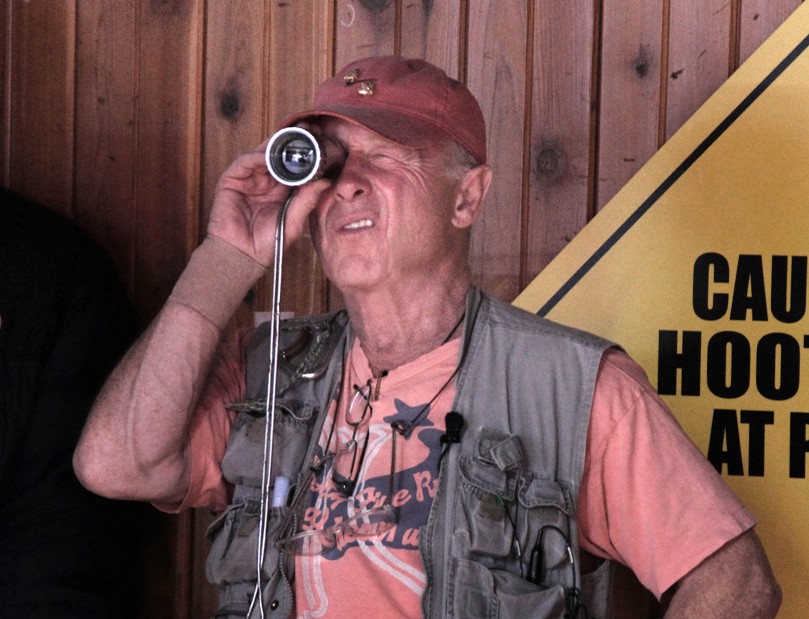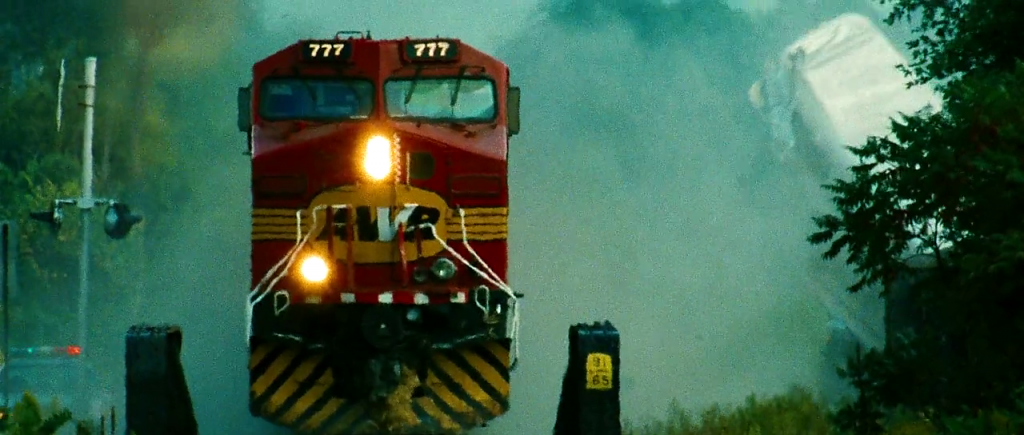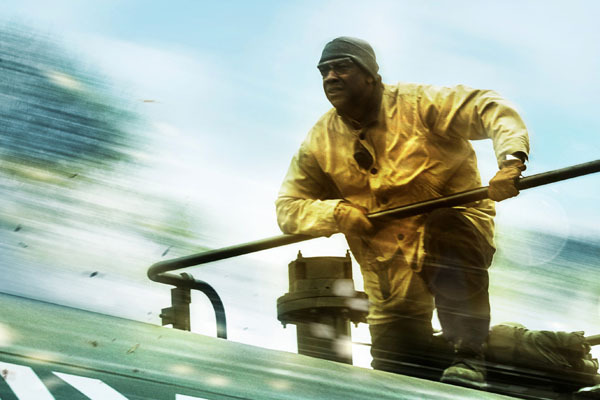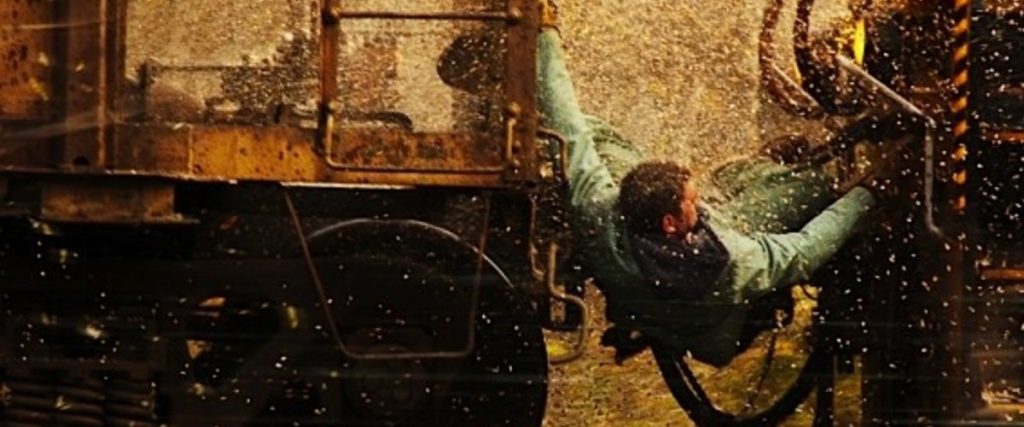The world is too messed up to obsess over bad movies as much as we do; isn’t it time we obsess over good ones? In his monthly column You Have To See This, Chuck Winters reaches into his pile of flawed, forgotten, or just plain fascinating gems to figure out what makes them tick and what makes them matter.
[This month’s column discusses suicide and depression. Reader discretion is advised.]

To be clear, I doubt Tony Scott knew that Unstoppable would be his last film. The film was released in 2010; Scott jumped off the Vincent Thomas Bridge in 2012. Ridley Scott claimed in 2014 that he had been quietly battling cancer, but the coroner’s report didn’t find any cancer in his body; just “therapeutic levels” of mirtazapine (for depression) and eszopiclone (for insomnia), both of which can cause suicidal feelings and ideation…which is borderline farcical when you think about it.
It’s foolish to make assumptions about what goes on within anyone’s mind, depressed or otherwise. However, I feel more confident assuming that when a filmmaker gets to a certain age, he or she realizes that they only have so many more stories they can reasonably expect to tell, and a Scott Brother would have more of a privilege to pick what those stories might be. Unstoppable wasn’t Tony Scott’s baby—Martin Campbell was originally set to direct—but he still saw a story that fascinated him enough to devote two years of whatever life he had left to it.
A few words about the Scott Brothers. Both Ridley (the older brother) and Tony (the younger brother) graduated from the Royal College of Art; Tony was more interested in painting, but Ridley invited him to work for his ad agency, RSA, so he could pay off his debts. So while Ridley was off building himself up as a feature filmmaker, Tony was making commercials to pay his bills. He took one stab at narrative in 1983 with The Hunger, but it flopped, so he settled into painting and commercial directing for the long haul.
Then Jerry Bruckheimer, developing a taste for the stylized work being done by British commercial directors like the ones working for RSA, asked Tony to do Top Gun. Tony would make six films and a lot of bank for Bruckheimer, while Ridley would flounder around after Blade Runner‘s release until Thelma & Louise, then flounder around some more until Gladiator.
Tony’s commercial success clearly outpaced his older brother’s in the late ’80s through the ’90s, but ask anybody who knows the work of the Scott Brothers today, and you’ll probably hear that Ridley is the formal, thoughtful director while Tony’s the flashy, empty one. You could probably write a whole book on their contrasting dynamics, especially when you get around to Tony’s later films, which I’d call “impressionistic” and also “batshit.” Most filmmakers settle down as they get older, more confident in what they know to work, less willing to play around and risk losing their audience. When Tony Scott got older, he made a short film for BMW about Clive Owen racing Satan (played by Gary Oldman) and Danny Trejo for the soul of James Brown.
Nobody really bothered to ask what all the sound and fury was about, however, because they were so sure it signified nothing.

Unstoppable doesn’t need any rehab from me; it’s rocking an 87% on Rotten Tomatoes, a ratio that increases to 90% among “top critics,” and it crossed the $100M mark at the box office. But if you look at the reviews that were counted, you’ll still see words like “implausible,” “ridiculous,” “silly,” and “cliché.” Just so we’re clear, I’m not here to roast the critics for getting it wrong, because they really didn’t; Unstoppable is the platonic ideal of a fire-and-forget popcorn thriller that adds nothing new, and anyway, it’s not a critic’s job to coddle an artist. What interests me is, “Why this?” Again, I don’t think Scott knew this would be his last movie. But he was still closing in on ’70 when he made it, and what I want to know is if there was something underneath the cheap thrills that led him to sign on, something that might have bolstered the movie against the sins of its narrative.
The basis for Unstoppable was The Crazy Eights Incident, wherein an Ohio freight train (number 8888) owned by CSX Transportation, towing thousands of gallons of toxic chemicals, ran away due to operator error. The unmanned train covered 66 miles over two hours, defying a portable derailer and CSX-approved efforts of the local police. It stopped after two engineers chased after the train, coupled onto it, and started pumping their brakes until it was slow enough for a third person to run up, climb aboard, and shut it down. There was no property damage or injuries, but that’s still a damn dramatic story—one that really didn’t need to be ginned up that much if you wanted to make it a movie.
But, you know. Hollywood. Right?
This might look awesome to you. It might also look like absurd, overdramatic bullshit. Sometimes it feels like there are only two types of movie fans in this world: The ones who roll with young buck Chris Pine withering under grizzled veteran Denzel Washington as they cowboy up to stop a screaming death train from obliterating a much cuter train full of adorable children…and the ones who don’t. Whatever your side, I want to point out a specific moment in that trailer: At one point, it looks like a SWAT team tries to stop the train by opening fire on it, as if has pain sensors that’ll encourage it to slow down. Here’s Manohla Dargis of The New York Times about what that moment is like in the full context of the film: “It’s a ridiculous image, openly laughable, yet it’s the kind of outrageous, excessive flourish that can make Mr. Scott’s work so enjoyable in the moment.” Note the term “excessive flourish.” Let’s keep that in mind for later.
For now, here’s this: A railroad junkie saved the discussion his mailing list had about Crazy Eights. It’s a dense read, chock full of terminology you likely won’t know. But I’m going to be referring to it a couple of times, starting with their reaction to CSX’s official report. The engineer at fault was a 34-year veteran of the railroad and had an otherwise spotless record. We’ll get into his fuck-up shortly, but no one could believe that someone with such a clean record could be so stupid, leading to some alternate theories and conjecture.
From that skepticism, Unstoppable starts to branch away from the true story. 33-year-old Ethan Suplee plays the dumbass hostler who loses the train, referred to here as the Triple Seven. The hostler, named Dewey because of course he’s a Dewey, is impaitent, self-centered, and lazy. Triple Seven gets away from him because—against strenuous objections from his co-worker (TJ Miller)—he hopped out of the cab of a train he was moving to try and quickly correct an issue uptrack rather than lose a few minutes backing up to do it properly. He also pulled out without tying the airbrakes, so as far as he knows, the only thing stopping the train is the independent brake he thinks he’s set and couldn’t possibly have slipped out of place.
Guys like Dewey, as veteran engineer Frank Barnes (Denzel Washington) points out to young conductor Will Coulson (Chris Pine), have been deemed to be the future of their company, AWVR. They’re cheaper, fresher, and more disposable, but they can be incredibly punchable and don’t seem to give half a shit about the work they do. It’s little wonder Frank and his friends are so cold towards Will when he first introduces himself, even less wonder Frank has little patience for Will constantly taking phone calls while they work.

Lest this appear to be a conservative-minded “fuck these young’uns” tale, Frank’s bitterness clearly has the better of him, making him unduly harsh toward Will despite often being right. (The reason Will’s on the phone so much involves him trying to resolve a stressful family matter.) Meanwhile, yardmaster Connie Hooper, played by pretty, vibrant, yet steel-nerved Rosario Dawson, emerges as the primary hero of the “talking heads” portion of this disaster drama. Scott isn’t interested in whining about the kids on his lawn; sure, Dewey’s an asshole, but the film is more inclined to sigh at him, and even has empathy for him when the cost of his shitty attitude hits home. Scott saves his real judgment for corporate stooges like Oscar Galvin (Kevin Dunn), whose fixation on the bottom line makes a bad situation even worse, as well as Galvin’s superiors, who callously make decisions that will negatively impact lives over casual rounds of golf. Unstoppable is a film that’s dripping with anger at the capitalist class, normally a staple of the older Scott brother.
That anger might seem cute, or otherwise ineffectual, given how empty Tony’s films have appeared to be in the past. His reputation may have been well-earned, but here he leverages his supposed weaknesses to sneakily cut even deeper on the subject than Ridley ever did. Again Unstoppable breaks from reality; whereas the decision was apparently made to attempt a derail as soon as it was clear that Crazy Eights was a runaway, Galvin suggests putting another train in front of Triple Seven to slow it down enough for another employee to dramatically board by helicopter. The thinking? Derailing the train could devalue AWVR’s stock by, well, any amount, so somebody’s gonna have to do some action movie shit for the sake of the quarterly earnings call.
Meanwhile, whereas the news didn’t catch onto Crazy Eights until after it was stopped, Triple Seven becomes a media snow day. Scott doesn’t even bother to differentiate his fluid, quick-cut shooting style whenever the point of view switches to the news, insinuating that rural Pennsylvania is somehow attracting the best cameramen and editors in the country. Arguably, this is a careless or just plain lazy mistake, but I think what Bob Ross says about mistakes applies here. There’s a sick fascination with how the media covers this story, waiting with baited breath for disaster or salvation, dramatically positing what might happen if the train derailed in one place or another to fill time. In Unstoppable, the efforts of Tony Scott, Action Movie Director, and the efforts of the press are one and the same. If that’s an accident, it’s certainly a happy one.

This sort of passive media critique actually dovetails nicely with the film’s more active critique of the capitalist class. You have to look between the lines here, but consider this: After 16 years, we still don’t know the name of the guy who was responsible for letting Crazy Eights run away. CSX kept that on lock. AWVR, on the other hand, has no compunctions about releasing Dewey’s name and his picture to the press. This goes completely uncommented on in the text of the movie, but it gives the in-universe media a villain in their narrative even as we, the audience, realize that Galvin and AWVR corporate are the true villains here. It’s a stretch, but it establishes the media’s role in AWVR’s damage control.
Let’s jump to that first attempt to stop the train. If Galvin’s plan is about keeping AWVR’s stock shored up, then what better way to ensure as much than a dramatic helicopter rescue on live TV? Enter RYAN SCOTT, the guy who tries to board Triple Seven via chopper. RYAN SCOTT gets one, maybe two lines of dialogue in the film, all of it incidental. But the press covering the incident makes it a point to reveal that RYAN SCOTT is 22 and a Marine that just got back from Afghanistan. Because when you’re about to show some action movie shit on live TV, of course you want to assure your viewers that you’ve got a real life action hero on the job. The fictional people in the film’s universe, watching from the comfort of their homes, know more about RYAN SCOTT than Judd Stewart, a friend of Frank’s and the conductor of the train tasked to slow Triple Seven down. The sequence is shot and scored like a horror movie. We know this isn’t going to work. The people watching on TV know deep down this isn’t going to work. Sure enough, RYAN SCOTT can’t keep his footing once he’s on the runaway, and the world gets to watch Judd’s train derail and explode with him inside.
But, hey. RYAN SCOTT probably made it. (A pre-credits chyron assures you that yes, he did.)
Again: Nobody got hurt as a result of Crazy Eights running away. This is all exaggeration on the part of Scott and credited screenwriter Mark Bomback; the question is, to what artistic end, if any? The history of the disaster movie is lousy with corporate hubris leading to needless loss of life. What makes this case so special, or at the very least necessary?
Remember that part in the trailer where the SWAT team was shooting at the train to try and stop it? The part that Mahnola Dargis essentially said was so stupid it was kind of cute? In the film, it’s actually a last ditch effort to hit the train’s fuel cut-off switch—a small red button under the engine. The SWAT captain orders his team to light the button up when it passes by, then immediately tells them to cease fire in a panic when he realizes that it’s right next to a big red fuel cap. When the press tries to explain it, it’s in a scornful “what the fuck were they thinking” tone. It’s as if the movie’s taking you by the shoulder and telling you “I know. I know you think it’s stupid. It looked really cool, but you’re right. There’s no way, absolutely no way that anyone in their right mind would ever commit such resources to such a reckless plan.”
…By any chance, did you happen to read that whole play-by-play I passed on to you earlier?
Among the more bizarre incidents in the two-hour attempt to stop the train was the effort by police to activate the 8888’s fuel cut-off switch by shooting it. CSX officials acknowledged today that they were aware of police attempts to disable the locomotive by firing upon it. Instead of hitting the red fuel cutoff switch, however, three shots hit the locomotive’s fuel cap, which is also red, CSX said.
That scene that everyone wrote off as more of Tony Scott’s flashy, stupid bullshit? That was a dramatization of the CSX-approved efforts by the police to stop the train. Now to be fair, the scene itself feels extraneous. It plays out in the thick of Frank and Will chasing Triple Seven down before it can reach certain derailment (and disaster) in the city of Stanton, cutting into the movie’s momentum. It is, as Dargis said, “excessive flourish.” It’s excessive flourish, however, that ACTUALLY FUCKING HAPPENED. It’s the closing argument for why Tony Scott had to Tony Scott it up: Yes, it’s an action movie and not a Coen-esque farce. But it’s also reflective of at least part of the actual thinking that went into trying to stop Crazy Eights; a potentially destructive part.
With Unstoppable, Scott uses his own propensity for action movie bullshit to call out irresponsible action movie bullshit, the type that trades on titles like “police officer” or “US Marine” and service records like “Afghanistan” or “can shoot high powered automatic weapons,” the type done in service to the Oscar Galvins of the world, served up to the masses as saviors to keep them glued to the TV and keep the shade off of corporate wrongdoing. By comparison, Frank and Will go after that train at great personal risk and little promised reward because the alternative is not having a home to come back to. That they’re subsequently subsumed by the media narrative that’s desperate for a hero doesn’t matter. Real heroism isn’t about who you are and what you do under orders, Scott argues; it’s about what you decide to risk for others. A well-worn sentiment, sure, but not often so artfully delivered as it is here.

Or maybe it really is nothing. Maybe they’re all accidents. Maybe it’s just an entertaining, empty-headed popcorn thriller, and I just wasted your time. Hell, when you actually watch the movie—and you should watch it, it’s gripping and funny and flat out cool in ways I don’t have room to touch on—you’ll pick up on things that actively work against my read. In fact, the reveal of Dewey’s ultimate fate at the end of the movie kneecaps any supposed anti-bougie message by low-key punching down on fast food workers.
Then again, maybe “accidents” are the point. Maybe he was operating unconsciously. Maybe he could have learned from these accidental successes and the mistakes that held them back. Maybe the Tony Scott of the 2010s could’ve been an even better class of action movie director, one with better control of the subversive streak he unleashed in the 2000s after letting it quietly bubble under most of his filmography.
We’ll never know.
Depression, from my own harrowing personal experiences, is a slovenly, tricky goblin of a disease that will keep finding new and interesting ways to convince you that you amount to less. I try to stay positive to combat it; every time I’ve given in to liking something “ironically” to some degree, it’s blown up in my face. So when I connect with a work, it’s important that I figure out why. It’s important I understand what my favorite storytellers are good and bad at, so I can properly appreciate the work they do and not just write them off as “guilty pleasures.” There’s nothing wrong with simply being entertained by a movie despite its flaws. However, there’s something enriching and affirmative about understanding why that movie works as well as it does.
I was probably never going to have the chance to tell Tony Scott how much I admired his work. But I still really fucking hate that there are no new films of his to look forward to.
If you’re struggling with suicidal thoughts and ideation, please don’t go it alone. Call the National Suicide Prevention Lifeline at 1-800-273-8255, or visit their website for an online chat.
If you know of any movies that you think deserve to be covered in You Have To See This, feel free to tweet your suggestions to @DivisionPost.
